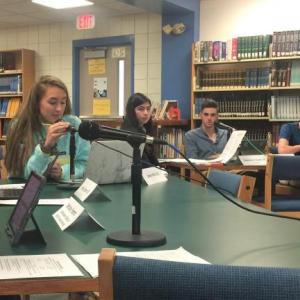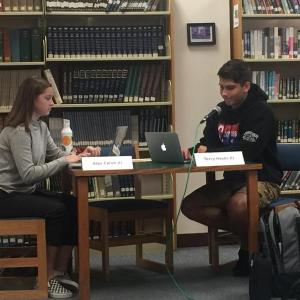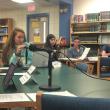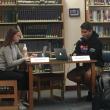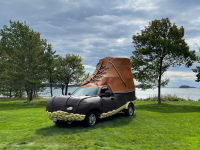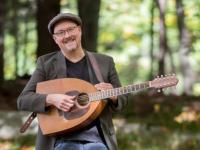BRHS students take on election debates
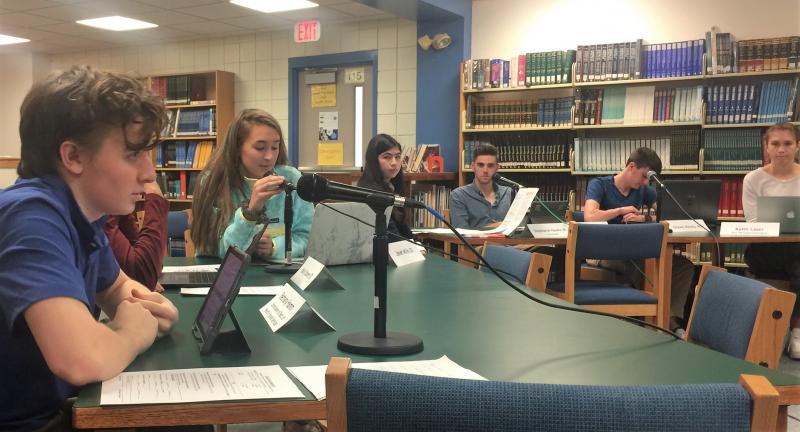 Tim Norton, left, plays the part of Maine DHHS Commissioner Bethany Hamm. From left, behind Norton are Will LaBrecque, Chloe Arsenault, Lauren Barclay, Tim Chappelle, Will Perkins and Faith Blethen. JOSEPH CHARPENTIER/Boothbay Register
Tim Norton, left, plays the part of Maine DHHS Commissioner Bethany Hamm. From left, behind Norton are Will LaBrecque, Chloe Arsenault, Lauren Barclay, Tim Chappelle, Will Perkins and Faith Blethen. JOSEPH CHARPENTIER/Boothbay Register
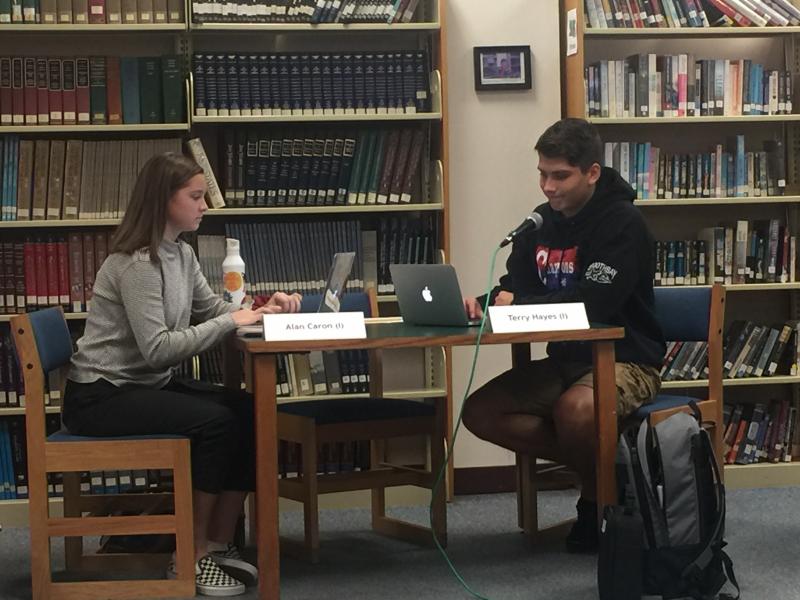 Hali Goodwin and Graham Harris were the first to jump into debate on ballot initiative Question 1. JOSEPH CHARPENTIER/Boothbay Register
Hali Goodwin and Graham Harris were the first to jump into debate on ballot initiative Question 1. JOSEPH CHARPENTIER/Boothbay Register
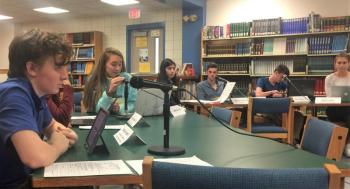 Tim Norton, left, plays the part of Maine DHHS Commissioner Bethany Hamm. From left, behind Norton are Will LaBrecque, Chloe Arsenault, Lauren Barclay, Tim Chappelle, Will Perkins and Faith Blethen. JOSEPH CHARPENTIER/Boothbay Register
Tim Norton, left, plays the part of Maine DHHS Commissioner Bethany Hamm. From left, behind Norton are Will LaBrecque, Chloe Arsenault, Lauren Barclay, Tim Chappelle, Will Perkins and Faith Blethen. JOSEPH CHARPENTIER/Boothbay Register
 Hali Goodwin and Graham Harris were the first to jump into debate on ballot initiative Question 1. JOSEPH CHARPENTIER/Boothbay Register
Hali Goodwin and Graham Harris were the first to jump into debate on ballot initiative Question 1. JOSEPH CHARPENTIER/Boothbay Register
No matter what ideology, to be successful in debate is to gather, assemble and present evidence and fact, said Boothbay Region High School AP Language teacher Mark Gorey. A project has been putting students in the shoes of officials or political candidates.
“It's always interesting doing this project to see students encounter questions on their feet and how they're going to respond. People (get) some questions that they may not know right away, but they appropriate responses and say 'I'm going to get back to you on that.'”
One of the greatest parts of debate is that technology allows the student to do some quick research when asked to clarify a position or prepare a rebuttal, said Gorey. It also allows for quick viewings of news specials and recorded debates to get students more in tune with the issues, and help show them how to debate from the perspective of their assigned candidate or official.
The students had given their opening statements in their last class and were ready to give their first debate a go. The topic was the ballot initiative “Question 1” – the only initiative denied at the polls. The atmosphere instantly relaxed as virtually all parties represented at the debate have publicly denounced the initiative. Not so fast.
“We are aware of your stated views as to why you are voting against the initiative. We're curious to know whether you think the status quo of in home care in Maine is acceptable or not as well as the wages of the employees involved …,” posed Gorey.
The gears started turning and a couple students asked if they could spend a little time researching before posing a statement, but the extra push brought well thought out statements on the fly. This was likely in part due to volunteers from the Rotary Club of Boothbay Harbor. A number of Rotarians, most with some legal background, have been helping students research and prepare for debates. Gorey mentioned Chip Griffin, Bill Bailey, Skip Kreahling and Steve Solario as current or past supporters.
Kerrin Erhard has also been serving as a moderator for the debates pushing students to clarify, defend and refine their talking points. This helps Gorey keep track of how students are performing and dig in a little deeper and push the critical thinking a little further.
In an interview with three of the students, junior Will Perkins said the process was interesting: Students started off the project by researching and discussing topics which would eventually be featured in the debates. With several topics to start with, junior Graham Harris said the class whittled them down to three – healthcare, jobs and economy, and education – through none other than ranked choice voting.
“We chose the District 89 race and the gubernatorial race which left three of us without candidates,” said senior Faith Blethen. “So, three of us had to become specialists in their debate topics.”
Blethen said this was ultimately much better than trying to cover all the local and big state elections because it would have spread the class too thin. Blethen was Alternative Organizational Structure (AOS) 98 Superintendent Keith Laser who represented a specialty in education. Classmates Tim Chapelle and Tim Norton played the parts of Maine Department of Labor Commissioner John Butera and Commissioner Bethany Hamm of Maine Department of Health and Human Services.
Students said getting in the heads of their characters was not all that difficult. The greatest difficulty, said Harris, was answering a question upon which one’s character has not delivered a statement.
“If you didn't know (the position) and hadn't seen them say anything about it, then – you couldn't make something up, you had to be your character,” said Harris.
“Or if they didn't have a statement, you'd have to kind of go off of what they had as their ideas and you'd have to go with what you believe they'd think based off what their other things are,” added Perkins.
BRHS’s mock election made the project especially exciting to the students. Perkins said it was a cool touch, though it had nothing to do with their course's debate project. Since school mock elections usually mirror actual outcomes due to students typically voting as their parents do, Blethen said, she was surprised to find that BRHS's outcome was almost a polar opposite to actual election results – BRHS went very red, said Blethen.
Overall, the students agreed the project was fun and beneficial as a bedrock of critical thinking and logic.
“It was cool to actually know the candidates and their views,” said Blethen. “We really just broke down each person and broke down each major topic that our class found important. It was very informative.”
This was exactly what Gorey goes for when he introduces debating to students rather than the odd poem or book which is ultimately followed by another and can easily be abandoned too quickly. This is something that lasts, said Gorey.
“I didn't have to do something like this when I was 16, 17 – I wish I had. It probably would have galvanized my whole political world much earlier …”
Gorey said a delicate balance is required in his stewardship of the class – he has his own opinions, too. That is why he brings in others to help coordinate the classes and provide invaluable support and experience. And when Gorey and his guest occasionally hash out their own political differences, it always ends with a handshake.
“If I can in any way model that kind of thing for students where you're having a conversation with one who has profound disagreements, but can at least acknowledge and try to hear the other side without flinging the ad hominem and dialing up the voice volume, it's a success.”
Event Date
Address
United States

